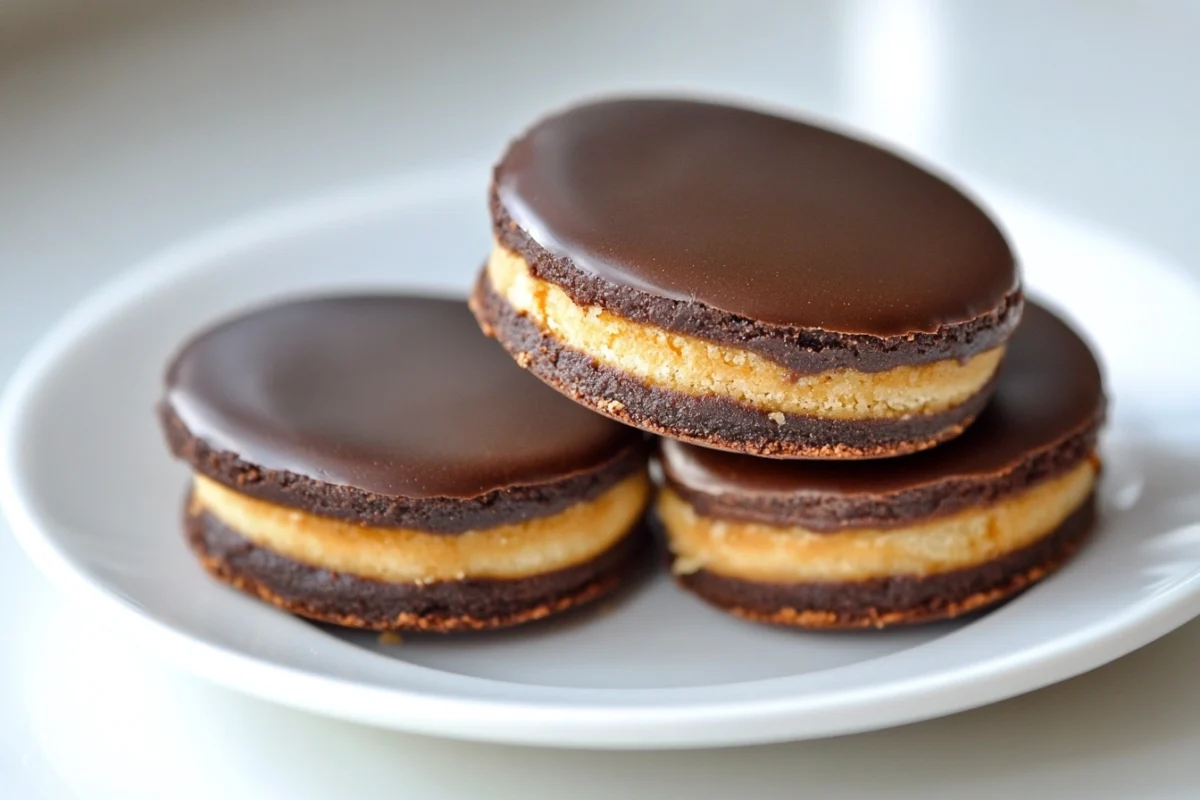A brief look into the Jaffa Cake lawsuit, its origins, and its impact on the confectionary world. This article will explore all aspects of this unique legal battle.
Understanding the Core of the Jaffa Cake Legal Case
The Jaffa Cake legal case is a fascinating dispute that has intrigued many. It centers on the debate about what constitutes a cake versus a biscuit. In the United Kingdom, this distinction is vital for tax reasons. Specifically, cakes are exempt from Value Added Tax (VAT), while biscuits are not. This legal action tried to settle this classification for good. Therefore, understanding the arguments used helps us see how things were settled.
Read more about : How do you eat turrón?
The Tax Issue Behind the Dispute
This legal challenge began because of tax regulations. Moreover, the question was if Jaffa Cakes should be taxed as cakes or biscuits. Consequently, this seemingly simple question led to a major legal battle. The outcome of the case had considerable implications for the food industry. Furthermore, it showed how legal definitions can impact businesses. This whole tax situation gave rise to the Jaffa Cake dispute.
Early Court Cases and Initial Rulings
The initial court rulings in this legal action were significant. Initially, McVitie’s, the makers of Jaffa Cakes, argued they were cakes. However, the tax authorities argued they were biscuits. Consequently, the courts had to analyze the characteristics of the Jaffa Cake carefully. The first rulings often sided with the tax authorities, treating Jaffa Cakes as biscuits. Therefore, McVitie’s had to fight harder.
The Arguments in the Jaffa Cake Legal Fight
Both sides in the Jaffa Cake legal battle used specific arguments. These arguments focused on the nature of the Jaffa Cake. Additionally, they debated what makes something a cake or a biscuit. Consequently, the legal battle became a very complicated affair. The whole Jaffa Cake matter hinged on this debate.
Why McVitie’s Said It Was a Cake
McVitie’s, the manufacturer, presented several points in court. They argued the Jaffa Cake had similar features to cakes. Specifically, they said the texture is like a sponge cake. Also, they pointed out that Jaffa Cakes go hard when stale. Conversely, biscuits go soft when stale. Moreover, they argued that cakes were typically eaten with a fork or spoon, even if that isn’t always how people enjoy them. The manufacturer wanted to solidify the cake nature in the Jaffa Cake case.
How the Tax Office Argued It Was a Biscuit
The tax authorities, however, had different ideas. They argued Jaffa Cakes have many biscuit-like traits. They pointed out it’s the typical size and shape of a biscuit. In addition, they noted that you often eat them with your fingers. Furthermore, they said the base of Jaffa Cakes is like a biscuit. Therefore, these reasons supported their claim. The tax office was certain in their biscuit classification for this Jaffa Cake disagreement.
Key Differences Between Cakes and Biscuits
The court had to look at the differences between cakes and biscuits carefully. Indeed, this distinction was vital for the ruling of the Jaffa Cake legal matter. Typically, cakes are spongier and larger than biscuits. Furthermore, cakes are often made from a batter, whereas biscuits use a dough. Additionally, the ingredients and cooking methods are different. Consequently, the court had to consider all these aspects in the Jaffa Cake legal action.
The Final Judgment in the Jaffa Cake Legal Case
This legal action ultimately reached a final ruling. The judge needed to consider all the arguments before making a decision. This judgment affected more than just McVitie’s. Specifically, it influenced the way other foods are taxed. This single case became extremely important for the whole industry because of the Jaffa Cake ruling.
The Legal Ruling and Its Impact
The judge finally ruled that Jaffa Cakes should be treated as cakes. Therefore, this meant they were not subject to VAT. This was a victory for McVitie’s. Moreover, the decision had a wider impact. It provided clarity on how to classify similar food items. The ruling in the Jaffa Cake legal dispute became an important point in the food industry. Undoubtedly, this ruling changed the food landscape.
The Criteria Used to Classify the Jaffa Cake
The criteria used by the judge were very important. Specifically, he looked at the physical characteristics of the Jaffa Cake. This included the texture, size, and how it’s eaten. Additionally, the judge considered how it compares to other food items. Accordingly, this helped settle the debate about the Jaffa Cake’s classification. The Jaffa Cake case provided a clear criteria for the future.
How Other Foods Were Affected by This Ruling
After this Jaffa Cake matter, other food manufacturers took note. Indeed, they looked at how the ruling might affect their products. The decision provided a framework for classifying food for tax purposes. Furthermore, it showed how important legal definitions are. Consequently, businesses understood how they had to manage this situation carefully. This landmark decision changed the landscape because of the Jaffa Cake decision.
Lasting Impact of the Jaffa Cake Legal Action
The Jaffa Cake legal action had a lasting impact in the food industry. Indeed, it changed how tax laws were interpreted. It also shows how a seemingly small issue can create a big legal battle. The long-term effects of this legal battle are undeniable.
The Importance of Tax Classifications in Food
The Jaffa Cake controversy highlighted how important tax classifications are for food products. Furthermore, these classifications affect a business’s profitability. Moreover, they also impact the price of products for consumers. Consequently, understanding tax laws is essential for food manufacturers. This case made everyone aware of tax classifications due to the Jaffa Cake case.
How the Jaffa Cake Legal Battle Changed Legal Interpretations
This case changed how legal definitions were seen. Specifically, the ruling highlighted that items should be assessed for their basic characteristics. Moreover, the court used a practical approach to decide what a cake should be. Accordingly, the Jaffa Cake dispute set a new benchmark. This approach has since been used in other cases because of the Jaffa Cake legal action.
Consumer Perception Following the Case
After the Jaffa Cake case, consumers also had a different perspective. Specifically, they now understood the differences between cakes and biscuits. Moreover, the publicity of the case made them question the classification of their favorite treats. Therefore, it led to a much greater appreciation for food categorization. Furthermore, the Jaffa Cake issue actually made people more aware of how food is categorized.
The Jaffa Cake Legal Action and Its Place in History
The Jaffa Cake legal action is more than a legal case. It’s a story about food, taxation, and interpretation. Furthermore, it is a remarkable example of how everyday items can become the center of legal disputes. It’s a unique moment in history thanks to the Jaffa Cake legal battle.
A Unique Case in British Law
This legal action stands out as a unique case in British law. Indeed, it demonstrates how even something as simple as a cake can lead to complex arguments. Additionally, it shows how legal definitions can change how we view everyday items. Ultimately, the case is a memorable moment in British legal history. The Jaffa Cake dispute is still discussed today in law schools.
The Jaffa Cake as a British Icon
Jaffa Cakes themselves are also a British cultural icon. Therefore, the legal case only made them even more popular. Moreover, the legal action added to the stories about them. Consequently, many people see it as more than just a snack. They see it as a part of British history. This iconic status was heightened by the Jaffa Cake situation.
Why This Case Still Matters Today
The Jaffa Cake legal situation still matters today because it teaches us some valuable lessons. Specifically, it showed us the effect of tax laws on food businesses. Moreover, it reminds us how carefully legal definitions need to be created. Therefore, it serves as a guide for all those involved in the food industry. Accordingly, it is still a relevant topic for study today. The case remains important due to the key lessons of this legal battle.
Analyzing the “Jaffa Cake Legal Issue”
What is the Jaffa Cake lawsuit? It’s a question that goes beyond a simple legal battle. It involves a study of food, tax, and how we define things. Indeed, the case shows how complex the simplest items can become. This legal issue has many layers to it.
The Case’s Impact on Food Law
The case has had a significant impact on food law. Specifically, the ruling set a standard for how to decide if a product is a cake or a biscuit. Furthermore, it highlighted the importance of clear legal definitions. Consequently, food law has become more aware of this problem. The Jaffa Cake dispute changed how food law is applied.
Lessons Learned from the Legal Battle
This legal action also teaches some good lessons. Specifically, it teaches us how small details can impact larger issues. Moreover, it highlights the importance of understanding the laws that govern us. Therefore, this case is an example for businesses and people alike. This valuable lesson came directly from the Jaffa Cake case.
Further Reading on Food Tax Laws
For those interested in learning more, there are several places to explore further into food tax laws. Indeed, you can look at the official government websites for clarification. Moreover, several legal publications have more articles about similar cases. Therefore, anyone wanting to understand this topic can do so easily. Specifically, understanding the Jaffa Cake situation can lead to a deeper understanding of similar topics.
Detailed Look at the Legal Arguments
The arguments in the Jaffa Cake legal case were not straightforward. Indeed, both sides presented very strong points. These points focused on the physical and characteristic nature of the product. Moreover, the arguments delved into how food is generally categorized. The Jaffa Cake disagreement was a complex matter.
McVitie’s Defense Strategy
McVitie’s didn’t just argue that their product was like a cake. They also highlighted how it was different from a biscuit. Specifically, they stressed the soft, sponge-like texture of the base. Furthermore, they brought up the way the product hardens when stale. Moreover, they showed that Jaffa Cakes are usually eaten as a small cake rather than a typical biscuit. These points were key to their success in the Jaffa Cake legal battle.
The Tax Office’s Claims
The tax office, however, didn’t agree. They pointed out that the Jaffa Cake has a base that was similar to a biscuit. Moreover, they focused on its size and shape. Additionally, they showed that you can often eat Jaffa Cakes with your hands like any other biscuit. The case seemed like it could have gone either way because of these points in the Jaffa Cake legal action.
Expert Witnesses and Their Contributions
Expert witnesses also played a crucial part in this Jaffa Cake legal dispute. These witnesses were food scientists and industry professionals. They presented in-depth analyses of the physical structure of both cakes and biscuits. Specifically, they explained how the Jaffa Cake’s construction is closer to a cake. Moreover, they helped clarify the differences between a batter and a dough. Their expertise was critical in settling the Jaffa Cake case.
The Cultural Significance of the Jaffa Cake Legal Case
Beyond the legal and tax implications, this legal action also had cultural relevance. It became a topic of discussion in the press. Moreover, it sparked debates in households across the UK. Indeed, this case showed how much a simple snack can be a part of a nation’s identity. This shows the cultural impact of the Jaffa Cake controversy.
The Jaffa Cake in Popular Culture
Jaffa Cakes are more than just food; they are a cultural icon in the UK. They have been the topic of many jokes. Moreover, they’ve been featured in media. The Jaffa Cake situation just added to their popularity. The fame of the Jaffa Cake helped make the case so popular.
The Role of the Media
The media played a crucial role in the Jaffa Cake legal issue. The case was featured in newspapers and on TV. Specifically, the press covered the arguments and the ruling extensively. Moreover, they provided analysis and opinion. Consequently, the public was well-informed about the case. The media amplified the discussion in the Jaffa Cake legal matter.
Public Opinion and the Case
The public had strong opinions about the case. Many people sided with McVitie’s. Specifically, they saw Jaffa Cakes as a cake. Moreover, they felt that the tax office was being too rigid. The public’s views added another layer to the Jaffa Cake situation.
FAQs About the Jaffa Cake Legal Battle
1. Why was there a Jaffa Cake lawsuit?
The Jaffa Cake legal battle occurred due to a disagreement over whether Jaffa Cakes should be classified as cakes or biscuits. This classification was important because it impacted Value Added Tax (VAT) liability. Cakes are typically exempt from VAT while biscuits are not. Thus, what is the Jaffa Cake lawsuit was a question about tax regulations on the confectionery.
2. What were the main arguments in the Jaffa Cake lawsuit?
McVitie’s, the makers, argued that Jaffa Cakes were cakes due to their texture and how they go hard when stale. The tax authorities, however, contended they were biscuits because of their size, shape, and how they’re typically eaten. Indeed, the core of the case is the definition of a cake versus a biscuit. The arguments were pivotal in this legal action.
3. What was the final verdict of the Jaffa Cake lawsuit?
The final verdict ruled in favor of McVitie’s, classifying Jaffa Cakes as cakes. Therefore, they were exempt from VAT. This decision was based on the characteristics of the product and how it’s made, highlighting the detail the court took in deciding what is the Jaffa Cake lawsuit. The outcome was a victory in this Jaffa Cake case.
4. What impact did the Jaffa Cake lawsuit have on the food industry?
The Jaffa Cake legal matter had a significant impact on the food industry. Specifically, it provided a framework for classifying food products for tax purposes. The decision showed how crucial legal definitions are. Moreover, it has helped clarify other cases. Indeed, this legal action has had lasting effects.
Conclusion
In conclusion, the Jaffa Cake legal battle is an extraordinary case. It showed how a simple snack could end up in a major legal dispute. The case centered on the distinction between cakes and biscuits for tax purposes. This seemingly simple issue led to a complex legal battle. The arguments used by both sides showed the difficulties of defining food. The final ruling in favor of McVitie’s was a significant victory. This outcome has shaped how food is taxed in the UK. The Jaffa Cake situation is much more than a legal fight about a snack. It is a memorable chapter in food law history. The implications of the Jaffa Cake controversy continue to be important. They highlight the need for clear legal and tax definitions. This case is an important example of how legal battles can affect culture and consumers.
Discover more about : What Is Usually In A Fruit Cup?




